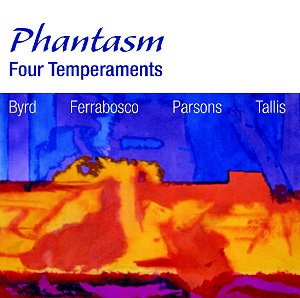"It was Hippocrates
who, in 'the Nature of Man', first identified
the four temperaments so as to help
diagnose illness. Corresponding to four
essential bodily 'humours' or fluids
(...) a patient was treated based on
the humour the physician reckoned to
be most dominant. The temperament also
evoked one of the four types of personalities."
Thus Laurence Dreyfus begins his liner
notes to Phantasm's recording of music
for viol consort by four composers of
the English renaissance: Tallis, Parsons,
Byrd and Ferrabosco I. He then identifies
the 'temperaments' which were most characteristic
of them. Tallis is the sanguine, reflected
by the optimistic character of his music.
Parsons is the choleric, who is quick
to anger. Melancholy, which leads to
sadness, is a feature of Byrd, whereas
Ferrabosco is the phlegmatic, who is
unshakeable. These features are represented
by the choice of pieces by the respective
composers in this programme.
I am not sure about
the relationship between the four temperaments
and music. I have looked into several
encyclopedias and music books, and couldn't
find any reference to 'temperament'
in the sense it is used here. I also
think it is highly speculative to link
a composer's personality to his music.
If a composer in the Elizabethan era
writes a lot of melancholic music, this
doesn't necessarily mean he is a melancholic
person himself, as melancholy was much
in vogue at the time.
I hasten to add that
Laurence Dreyfus admits nuances in his
temperament-based characterisation of
composers when he writes: "Naturally,
the emotions expressed in any given
piece are too complex to be reduced
to one humour and none of my attributions
are meant as all-embracing. In fact,
all four composers modulate skilfully
between the temperaments, just in different
ways. All people, according to this
way of thinking, are subtle admixtures
of the humours."
As a consequence the
'four temperaments' seem to me little
more than a stepping-stone to present
very different kinds of music for viol
consort as composed in the English renaissance.
If it was Phantasm's goal to demonstrate
how varied the repertoire for viol consort
was, then they have succeeded quite
brilliantly. Listening to the pieces
which are based on the famous 'In nomine'
theme, for instance, one is impressed
by the many ways composers have dealt
with it.
An interesting aspect
of this recording is the performance
of Byrd's 4-part Mass. It is noted in
the booklet that it wasn't unusual in
those days to perform vocal music with
instruments only. It is a tribute both
to the quality of the composition as
to the level of playing that the content
of the mass comes through very clearly
in this instrumental performance. The
sections of the mass are interspersed
with settings of 'In nomine' - the theme
of which comes from John Taverner's
Mass Gloria tibi Trinitas, creating
a kind of liturgical setting.
Another item which
particularly pleases me is the first
piece of the programme: Tallis's 'A
Solfing song', which was originally
written for viol consort, but has a
strongly vocal character, and could
easily be sung on a given text. Another
fine contribution is Robert Parsons'
'A Song called Trumpets', with its fanfare-like
motifs. He was the most experimental
of these four composers, and puts the
performers to the test in his 'Ut re
mi fa sol la': "The texture becomes
'untamed' in a moment of panicked frisson
when all four players enter a distinct
time zone (...), each forced to count
in a way which disrupts the others.
(...) The piece became addictive once
we made it to the end without 'falling
off' the ever-present precipice. Which
took a good while." It is good to know
that they are human after all.
This recording is an
impressive addition to the growing list
of brilliant recordings by Phantasm,
many of which have received or have
been nominated for awards. Another good
candidate for an award - the playing
is outstanding. The sound is crisp and
clear, yet warm and vibrant. The melancholy
of some pieces is just as well realised
as the more joyful works, where the
ensemble displays a strong sense of
dynamics and rhythm. In short, this
disc presents English consort music
in its full glory.
Johan van Veen












